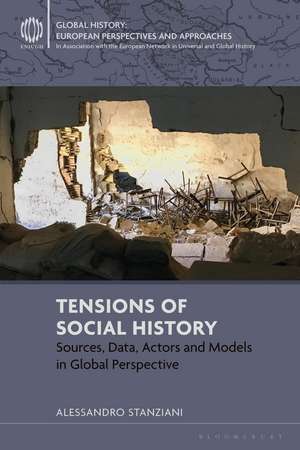Tensions of Social History: Sources, Data, Actors and Models in Global Perspective
Autor Alessandro Stanzianien Limba Engleză Paperback – 24 iul 2024
| Toate formatele și edițiile | Preț | Express |
|---|---|---|
| Paperback (1) | 191.67 lei 6-8 săpt. | |
| Bloomsbury Publishing – 24 iul 2024 | 191.67 lei 6-8 săpt. | |
| Hardback (1) | 510.83 lei 6-8 săpt. | |
| Bloomsbury Publishing – 11 ian 2023 | 510.83 lei 6-8 săpt. |
Preț: 191.67 lei
Preț vechi: 249.53 lei
-23% Nou
Puncte Express: 288
Preț estimativ în valută:
36.68€ • 37.89$ • 30.53£
36.68€ • 37.89$ • 30.53£
Carte tipărită la comandă
Livrare economică 26 martie-09 aprilie
Preluare comenzi: 021 569.72.76
Specificații
ISBN-13: 9781350276857
ISBN-10: 1350276855
Pagini: 248
Dimensiuni: 156 x 234 x 25 mm
Greutate: 0.35 kg
Editura: Bloomsbury Publishing
Colecția Bloomsbury Academic
Locul publicării:London, United Kingdom
ISBN-10: 1350276855
Pagini: 248
Dimensiuni: 156 x 234 x 25 mm
Greutate: 0.35 kg
Editura: Bloomsbury Publishing
Colecția Bloomsbury Academic
Locul publicării:London, United Kingdom
Caracteristici
Shows how western approaches to and theories of globalization have developed through transnational interactions
Notă biografică
Alessandro Stanziani is Professor of Global History at the School for Advanced Studies in the Social Sciences (EHESS) at PSL Research University, France. He is the author of 11 books including Eurocentricism and the Politics of Global History (2018) and After Oriental Despotism (2014).
Cuprins
IntroductionPart I - What is a Source ? Archives, Memory and Contested Contextualities1. Revolutionary Archives2. Archives in the Twentieth Century: From Communism to the DecolonizationConclusion to Part IPart II - The Social Life of Data1. Archives, Data and Models2. When One Person Eats Two Chickens and Another None, On Average They Eat One Chicken Each: The Invention of Social Statistics Under Capitalism3. Environment and Social Inequalities: How Are Data Made and by Whom?Conclusion to Part IIPart III - Fragments of Social Worlds1. Introduction2. What is a Worker, What is a Slave?6. What is a Peasant? The Global History of "Immobile People"7. What is a Consumer ? Identities and Alterities in the StomachConclusion to Part IIIPart IV - The Quest of Universality: Values, Theories and the European Model1. Societies and their Evolution: From the Enlightenments to Marxisms2. Weberian WorldsGeneral ConclusionSelected BibliographyIndex
Recenzii
This is probably the best synthesis I have read of the debates in history and social sciences. In fact, it is much more than that: debates, which have been going on for centuries, are re-interpreted according to an original analysis framework centered around four axes, namely sources, data, actors and models. This social history of social history is powerful, stimulating, and eminently useful.
